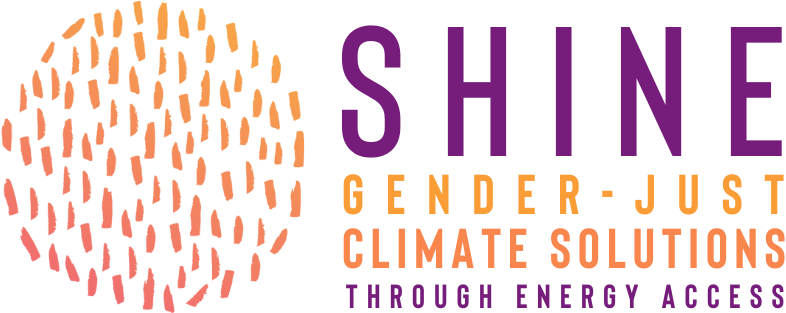By Mela Chiponda, SHINE Director
September 21, 2023
Ending fossil fuels and transitioning to renewable energy should be front and centre at the Climate Ambition Summit now competing for attention in New York city. Just scan the placards carried by tens of thousands of protesters clogging the streets for climate justice on September 17th to see how consistent and urgent this agenda is for people and the planet. At the heart of the debates about renewable energy is the question of power, and by power, I mean more than electricity. It’s about who decides, who has access and who benefits. These are not minor questions; this is at the heart of what a “just” transition demands.
Localised renewable energy alternatives are an important, though still under-resourced pathway that begins to address climate change and inch toward the democratisation of energy systems. But they rarely consider the needs of rural and indigenous women who bear the brunt of energy poverty and climate-induced disasters.
When decentralised renewable energy solutions leave out gender as an analytical category, and when there is no opportunity to examine nor address gender blindness, then community energy access will not serve women’s energy needs. Leaving women out is a recipe for failure not just because we are half the world’s population. In the continent of Africa, where I live and work, we are the farmers, caregivers, first responders and adapters to climate change and the drivers of development. If renewable energy access is to be guided by gender justice, it should emancipate women from energy poverty and ensure meaningful access and participation in energy systems.
Just imagine how solar-powered borehole pumps might free up the time of women and girls responsible for collecting water for home consumption or expand the harvest from local farming. Imagine how solar lighting in a local clinic far from the grid can reduce maternal mortality, or in a market place, can increase women’s safety. Those same lighting systems can provide a charging station for cell phones and laptops to improve everyone’s access to information and enable greater participation in climate and economic decision-making. Imagine women-headed businesses playing a vital role in the distribution of renewable technology. You don’t have to imagine… these are all happening on the ground today but are under resourced and undervalued as gender equality and climate solutions.
Gender-blind solutions that claim to be socially and culturally appropriate inevitably fail to account for women’s participation in energy generation, distribution, and consumption because of the entrenchment of patriarchal beliefs and practices within local structures. As gender experts have argued for decades, the “myth of community[1]” as a homogenous unit – particularly in the African continent – conceals the realities of unequal power relations that determine access. Decentralised community-driven renewable energy systems should be sensitive to the multiple forms of oppression that marginalise women and vulnerable groups, and have a clear proposition for gender-just, climate-just, decentralised renewable energy systems that address gender inequality.
To address energy poverty in rural areas, most governments in Africa invested in rural electrification programmes. This has not been successful because of the high costs of grid extension and low load regimes associated with rural communities. It was assumed that the initial costs of rural electrification would be high, but it was also assumed that the marginal costs would decrease as connection and consumption rates increase. However, not only did the rural electrification contribute to an unsustainable debt burden for many countries, but the anticipated increase in consumption was not realised as the electricity is often both unaffordable and not suited to local community livelihoods. Over time, women suffer the debt burden as debt repayments undermine the capacity of governments to meet gender equality, rights, and development obligations.
This is where SHINE comes in. SHINE is championing women-led, community driven, decentralised, climate-just, renewable energy solutions to address the triple threat of gender inequality, climate change and energy poverty. SHINE is working with women’s groups, women’s businesses and feminist movements in Africa with the appreciation that communities have the wisdom they need to drive the solutions if the resources are available. SHINE uses feminist participatory methodologies to engage with women’s groups while simultaneously creating innovative, unusual, and multidisciplinary partnerships across sectors, and elevating energy access as central to a Gender Just Transition.
Through participatory processes and community engagements with women in rural and peri-urban areas in Malawi, for example, it is abundantly clear that, despite some penetration of solar home systems, people still do not have the energy access to meet their expressed needs and priorities. Most households still cannot afford solar home systems. Continued energy poverty compromises people’s health, reduces access to education and livelihood opportunities. It reduces people’s ability to rise out of poverty and adapt to climate change.
Women are often viewed as energy users only and continue to be marginalised in decision-making related to energy services. Yet, they experience energy poverty much more severely than other groups. SHINE’s collaborative approach, building trusting relationships and shared leadership with the women in the communities puts women in charge of defining their energy priorities and choosing the energy systems they consider ecologically, socially, economically and culturally appropriate. Without energy services, women are unable to establish viable and resilient livelihoods.
The energy transition that SHINE envisions is not only technological but also provides the opportunity to develop socially just energy systems that address energy poverty, climate change and gender inequality. Harnessing renewable energy solutions should not reproduce the existing inequalities regarding gender, race, class and other social identifiers that place other groups of people on the margins of society. Energy transition is as much a feminist issue as it is a climate issue. A climate-just energy transition should address gender equality as women are severely affected by renewable energy development projects as carers, domestic workers, and subsistence producers. If due care is not given to addressing gender inequality and the power dynamics in the energy transitions, they will result in severe economic, social and financial repercussions on women and vulnerable groups in society. Access to clean and affordable energy stands at the core of development and well-being, and the future of the planet.
We urgently need to rethink and reshape the priorities and decision-making currently driving energy solutions to shift towards people-powered decentralised renewable energy systems that meet the needs of the women and groups bearing the brunt of climate change and living in energy poverty around the world. Women-centred energy systems prioritise the decarbonisation of energy systems, putting the rights and wellbeing of people and nature at the heart of a Just Transition.
Join us at SHINE in making that a reality.


